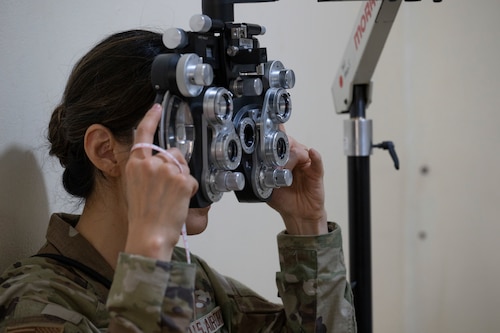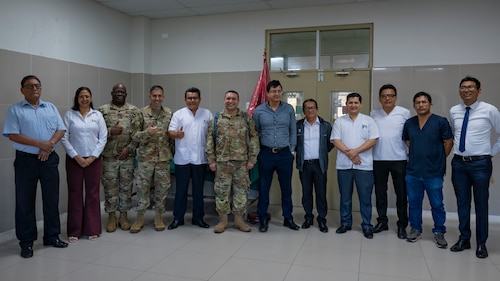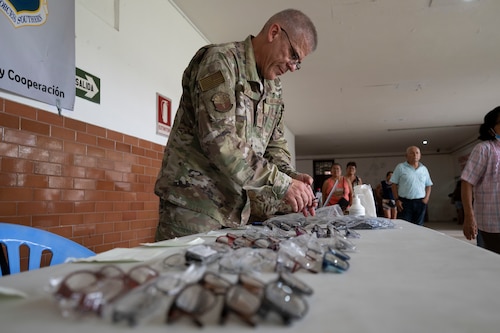U.S. Air Forces Southern (AFSOUTH) launched AMISTAD 2025 in Peru on June 2, marking the start of a global health engagement designed to strengthen partnerships and enhance deployment readiness across five Latin American nations.
For 10 weeks, teams of active-duty and reserve medical personnel will embed in hospitals and clinics across Peru, Suriname, Paraguay, El Salvador, and Panama - one country at a time. This operation aims to build interoperability with partner nations by alleviating pressure on their healthcare systems while providing U.S. Airmen with real-world opportunities to operate in resource-constrained environments, a crucial skill for deployment readiness.
"The Amistad mission is a tremendous opportunity for US military medics to engage in dense operationally relevant readiness activities while working shoulder to shoulder with our friends and partners," said Col. Brian Gavitt, AFSOUTH command surgeon. "In addition to patient care, our embedded medical teams engage in deliberate bidirectional knowledge exchanges so US medics can learn from our partners and vice versa. Amistad, similar to AFSOUTH's Lesser Antilles Medical Assistance Team (LAMAT) mission, is a critical opportunity to build readiness, relationships, and resilience within our hemisphere."
AMISTAD 2025 marks a significant expansion, welcoming U.S. Army medical personnel for the first time to work alongside their Air Force counterparts. Furthermore, medical teams from Canadian Armed Forces are participating in select locations, including Peru, El Salvador, and Suriname, making their initial contribution to the mission. This collaborative effort underscores a commitment to international cooperation and a unified approach to global health engagement.
"AMISTAD is a collaboration with each partner nation's Ministry of Health and the U.S. Embassy. Our teams provide care at facilities prioritized by the host nation," said Lt. Col. Aaron Goodrich, AFSOUTH deputy command surgeon. "Working side-by-side with our counterparts at these facilities facilitates partnership, knowledge exchange, and increases interoperability." He added that the two-week engagements consist of both clinical care and knowledge exchanges.
Each two-week engagement is coordinated through the host nation's Ministry of Health. Military medical teams provide direct patient care, conduct public health outreach, and facilitate clinical education and knowledge exchanges at medical facilities selected by the host nation.
"Physicians, nurses, and medical aides can learn new skills that allow them to treat cases they previously would have had to refer to other facilities," Goodrich said. "This side-by-side work helps improve capabilities within the host nation."
AMISTAD, which means friendship in Spanish, unites more than 240 U.S. medical professionals - including reservists and active-duty Airmen - specializing in dentistry, primary care, optometry, trauma care, emergency medicine, and other fields. According to AFSOUTH, a similar number of medical professionals are participating from the partner nations. By occurring within their deployment window, AMISTAD provides these medics with invaluable practical experience to hone their skills and enhance overall deployment readiness. Personnel selection is based on availability and the specific medical needs identified by each country.
"AMISTAD allows U.S. medics to work as a team in an unfamiliar and resource-limited environment, similar to a deployment," Goodrich said. "They accomplish critical pre-deployment skills, including diagnosing and treating conditions uncommon in the U.S. Many reserve personnel have civilian jobs outside the medical field, so these trips offer an opportunity to refresh their skills and prepare for contingency operations."
Each location offers a unique environment for U.S. medics to sharpen their skills and strengthen collaboration. By enabling total force medics to work in austere, real-world environments, AMISTAD not only boosts U.S. deployment readiness but also reinforces public health resilience in partner nations prone to natural disasters and public health crises.
"AMISTAD allows U.S. medics to work as a team in an unfamiliar and resource-limited environment similar to a deployment," Goodrich reiterated. "They're able to diagnose and treat conditions uncommon in the U.S. and refresh skills that are critical for contingency operations."









